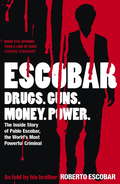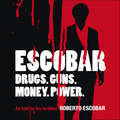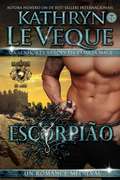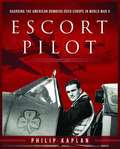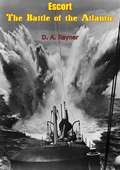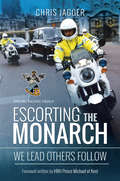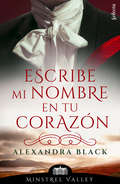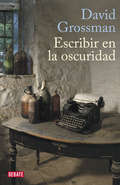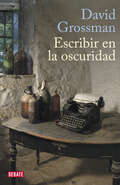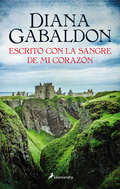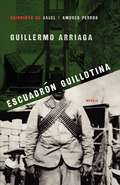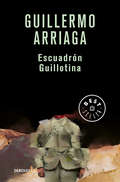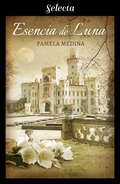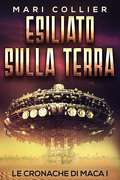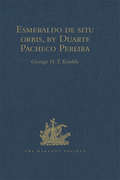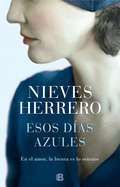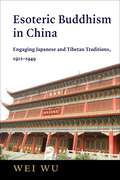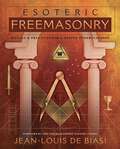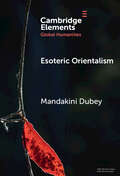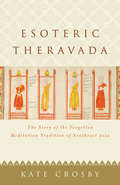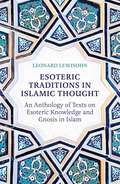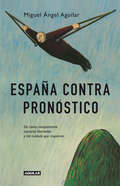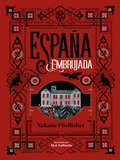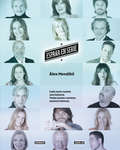- Table View
- List View
Escobar: The Inside Story of Pablo Escobar, the World's Most Powerful Criminal
by Roberto EscobarThe incredible bestselling true story of the rise and reign of the most wanted criminal in history, told by the one man who was with him every step of the way - his brother Roberto.Murderer, philanthropist, drug dealer, politician, devil, saint: many words have been used to describe Pablo Escobar, but one is irrefutable - legend. For the poor of Colombia, he was their Robin Hood, a man whose greatness lay not in his crimes, but in his charity; for the Colombian rich he was just a bloodthirsty gangster, a Bogie Man used to scare children in their beds; for the rest of the world flush with his imported cocaine, he was public enemy number one. During his reign as the world's most notorious outlaw, he ordered the murder of thousands - at one point even bombing a passenger jet - smuggled drugs into the US in mini-submarines inspired by Bond films, was elected to parliament, staged midnight escapes through the jungle from whole army battalions, built his own prison, consorted with presidents, controlled an estimated fortune of over $20 billion, and for over 3 years outwitted the secret American forces sent to kill him. His ambition was as boundless as his violence, and neither was ever satisfied. This is the first major, and definitive, biography of this remarkable criminal life, told in jaw-dropping detail by the one man who, more than any other, can understand just how far he came and just how low he fell: his brother, Roberto Escobar.
Escobar: The Inside Story of Pablo Escobar, the World's Most Powerful Criminal
by Roberto EscobarThe incredible bestselling true story of the rise and reign of the most wanted criminal in history, told by the one man who was with him every step of the way - his brother Roberto.Murderer, philanthropist, drug dealer, politician, devil, saint: many words have been used to describe Pablo Escobar, but one is irrefutable - legend. For the poor of Colombia, he was their Robin Hood, a man whose greatness lay not in his crimes, but in his charity; for the Colombian rich he was just a bloodthirsty gangster, a Bogie Man used to scare children in their beds; for the rest of the world flush with his imported cocaine, he was public enemy number one. During his reign as the world's most notorious outlaw, he ordered the murder of thousands - at one point even bombing a passenger jet - smuggled drugs into the US in mini-submarines inspired by Bond films, was elected to parliament, staged midnight escapes through the jungle from whole army battalions, built his own prison, consorted with presidents, controlled an estimated fortune of over $20 billion, and for over 3 years outwitted the secret American forces sent to kill him. His ambition was as boundless as his violence, and neither was ever satisfied. This is the first major, and definitive, biography of this remarkable criminal life, told in jaw-dropping detail by the one man who, more than any other, can understand just how far he came and just how low he fell: his brother, Roberto Escobar.(P) 2009 Hachette Audio
Escorpião
by Kathryn Le VequeEscorpião: Parte da série “Alcateia do Lobo” Um cavaleiro selvagem e heroico encontra o amor no coração da Inglaterra 1289 d.C. — Sir Kevin Hage, sofrendo pela perda do objeto de suas afeições para o guerreiro galês conhecido como Serpente, mergulha na guerra para esquecer as suas mágoas. Ele viaja para o Levante para lutar contra os infiéis muçulmanos, transformando-se durante este tempo. Ele se torna endurecido, brutal e heroico, e retorna à Inglaterra como um outro homem, um assassino inglês conhecido como Escorpião. Agora, na frente de combate doméstico, ele deve lutar uma batalha ainda maior — o medo de amar uma mulher sob circunstâncias extraordinariamente difíceis e com todas as chances contra eles. Acompanhe a história de Kevin e sua dama, em sua jornada de descobertas e aventuras, e o despertar de um amor que é maior do que todas as estrelas no céu, neste romance medieval inesquecível. Amor... teu nome é ESCORPIÃO.
Escort Pilot: Guarding the American Bombers Over Europe in World War II
by Philip Kaplan Andy SaundersSpitfire, Mustang, Lightning, Thunderbolt? in the darkest days of World War II, these legendary fighters escorted lumbering heavy bombers over enemy territory, providing protection, drawing cover, and taking on everything Germany’s Luftwaffe could throw at them.Escort Pilot is the lavishly-illustrated celebration of these unique heroes, painstakingly researched and beautifully designed. It conjures up the lost world of these daring US, British, and other Allied pilots. Readers witness gripping, first-hand accounts of deadly dogfights over Germany, accompanied by warm, humorous personal reminiscences of life on the ground, accompanied throughout by hundreds of period photos and reproductions of vintage artifacts and keepsakes - many in full color.Filled with engaging anecdotes, little-known fighter lore, and a wealth of fascinating and colorful details you’d expect ? from favorite, long-forgotten local pubs to personalized flight jacket artwork ? Escort Pilot is a richly evocative reminiscence of a heroic era and the larger-than-life personalities that inhabited it.
Escort in Deep
by K. A. FoxLeah loves her job as an escort. As her manager's top girl, she is classy, professional, and very, very expensive.When she is given a job for a threesome with a married couple, she expects the typical run of the mill husband and wife looking to spice up their marriage a little.It isn't until Mathew and Tate arrive that she realises she couldn't have been further from the mark.She has never broken her own set rules before but there's a first time for everything.
Escort: The Battle of the Atlantic (Classics Of Naval Literature Ser.)
by D. A. RaynerThis is the story of one man’s war and of the Royal Navy’s escort vessels—trawlers, corvettes and destroyers—that guarded Britain’s ocean life-lines across the Atlantic against the ravaging forays of U-Boats and surface raiders.This highly acclaimed firsthand account of convoy escort operations in the North Atlantic from 1939 to 1945 is based on Rayner’s astonishing war record.Denys Arthur Rayner was a Royal Navy officer who fought throughout the Battle of the Atlantic. After intensive war service at sea, Rayner became a writer, a farmer, and a successful designer and builder of small sailing craft.
Escorting the Monarch
by Chris JaggerEscorting the Monarch is as close to an official history of the Metropolitan Police's 'Special Escort Group' (SEG) as one could hope for.You may have seen the team at work; as the combination of motorcycles and cars pass you by, they glide elegantly and seemingly effortlessly through busy traffic. Developing a dedicated and diligent team culture, they are masters of their trade. They hold a well-earned reputation for excellence amongst their peers; delivering their passengers (and cargo) on time, safely, in a great deal of style, and without fuss or mishap. Professional and precise in the execution of their operations, they are neither shaken nor stirred.Although the work of the SEG demands exquisitely high levels of presentation there is little room for gloss or glitter. The individuals and property they are charged to protect are assessed by government to need the highest possible levels of protection. From queens, kings, presidents and emperors, to priceless works of art, terrorists and high risk prisoners, the group escort them all.Written by the son of a retired SEG officer who himself served in the British Government's security and intelligence community, Escorting the Monarch is told, in part, through first hand stories and anecdotes gleaned from former officers of the group. The insights offered are unique, privileged and first of their kind. Chris Jagger unfolds a collection of fascinating and never before told stories built on high profile events, such as the funeral of Sir Winston Churchill, and the visit of Nelson Mandela.Now the SEG have honed their skills for over 6 decades. Through a carefully constructed description of a changing security and political environment across the decades, and an insightful analysis of the ingenuity of those who have severed with the SEG, _Escorting the Monarch_ explains the events that made the group who they are today.
Escribe mi nombre en tu corazón
by Alexandra BlackUn amor prohibido durante la era victoriana. Jasper Lee, hijo mediano de los condes de Mersett —ahora marqueses de Leavenfield—, siempre ha sabido que era diferente a los demás. Consciente de que esto podría perjudicar y avergonzar a su familia, decide marcharse a China, donde se encuentra solo y desamparado. Dotado de un gran encanto, consigue abrirse camino hasta convertirse en alguien importante entre la comunidad china de Beijing. Allí conoce a Ethan Chang, un escritor de libros de viajes que se siente inmediatamente atraído por él. Debido a las intrigas de la corte, Ethan se ve obligado a casarse con una mujer a la que no ama ni podrá amar jamás, lo que lleva a Jasper a huir de China y regresar a Minstrel Valley, donde el miedo, la vergüenza y las dudas lo asaltarán y lo llevarán a alejarse de la persona que ama a pesar de que este se presenta en el pequeño pueblo del condado de Hertfordshire para confesar el amor que siente por él. ¿Conseguirá atravesar todas sus dudas y miedos? ¿Será capaz Jasper de enfrentarse a su familia por amor?
Escribir en la oscuridad
by David GrossmanSeis ensayos fundamentales de la obra de Grossman. Escribir en la oscuridad reúne seis ensayos en los que Grossman analiza con maestría y lucidez extraordinaria algunos de los temas centrales en su producción artística: las voces literarias que han ayudado a construir su obra, el Holocausto, la creación del Estado de Israel o los problemas derivados del mismo como marco de sus creaciones; el conflicto en Oriente Próximo y los devastadores efectos que provoca en la sociedad israelí, sometida a un consenso interior asfixiante, así como la incertidumbre acerca del futuro que ilustra el fracaso mayúsculo de un estado surgido precisamente para garantizarlo. Desde una perspectiva humanista, Grossman reivindica que la verdadera literatura se halla irremediablemente vinculada a la política que configura nuestras vidas, y nos ofrece las claves fundamentales para comprender su obra: un retrato extraordinariode las fuentes de la creación y un magnífico alegato en defensa de la paz en Oriente Próximo. Reseña:«El emocionante manifiesto de uno de los escritores más originales y mejor dotados no solo de su país, sino de todo el mundo.»The New York Times Book Review
Escribir en la oscuridad
by David GrossmanSeis ensayos fundamentales de la obra de Grossman. Escribir en la oscuridad reúne seis ensayos en los que Grossman analiza con maestría y lucidez extraordinaria algunos de los temas centrales en su producción artística: las voces literarias que han ayudado a construir su obra, el Holocausto, la creación del Estado de Israel o los problemas derivados del mismo como marco de sus creaciones; el conflicto en Oriente Próximo y los devastadores efectos que provoca en la sociedad israelí, sometida a un consenso interior asfixiante, así como la incertidumbre acerca del futuro que ilustra el fracaso mayúsculo de un estado surgido precisamente para garantizarlo. Desde una perspectiva humanista, Grossman reivindica que la verdadera literatura se halla irremediablemente vinculada a la política que configura nuestras vidas, y nos ofrece las claves fundamentales para comprender su obra: un retrato extraordinario de las fuentes de la creación y un magnífico alegato en defensa de la paz en Oriente Próximo. Reseña:«El emocionante manifiesto de uno de los escritores más originales y mejor dotados no solo de su país, sino de todo el mundo.»The New York Times Book Review
Escrito con la sangre de mi corazón (Saga Outlander #Volumen 8)
by Diana GabaldonOctava entrega de la exitosa saga de Diana Gabaldon "Outlander" en la que se basa la popular serie de televisión. Una historia de amor diferente, en la que los encuentros fortuitos y el juego equívoco del tiempo se conjugan en un intrigante final. Junio de 1778. El orden del mundo parece haber sido profundamente trastocado. El ejército inglés se retira de Filadelfia perseguido por George Washington, y por primera vez desde el inicio de la contienda da la impresión de que los rebeldes pueden ganar. En ese entorno tumultuoso, Claire y su familia deben afrontar múltiples trastornos y dificultades. El anterior marido de Claire, Jamie, al que se daba por muerto, ha regresado y le exige una explicación de por qué, en su ausencia, se casó con su mejor amigo, lord John Grey. El hijo de éste, el noveno conde de Ellesmere, descubre con igual estupefacción que su verdadero padre es el resucitado Jamie Fraser, y el sobrino de Jamie, Ian Murray, se entera de que su recién descubierto primo se ha enamorado de la mujer con la que él pretende casarse. Mientras Claire vive con el miedo de que uno de sus maridos mate al otro en cualquier momento, sus descendientes en el siglo xx tienen que enfrentarse a unos acontecimientos aún más apremiantes, pues a su hija Brianna la acosa un implacable criminal después de que su marido, Roger, haya desaparecido en el tiempo.
Escuadrn Guillotina (Guillotine Squad)
by Alan Page Guillermo ArriagaUn abogado, Feliciano Velasco y Borbolla de la Fuente, perfecciona el famoso invento de la guillotina y se la va a vender a Pancho Villa, el conocido general insurgente de la Revolución mexicana. A Pancho Villa no solo la idea le parece bien, sino que, en un gesto de humor, decide pagarle al abogado de una manera sorprendente: obligándole a alistarse en su ejército de insurgentes. A partir de aquí, el abogado nos va contando sus experiencias con la tropa de Villa y cómo poco a poco se introduce en la lógica de ese mundo disparatado, heroico y cruel al mismo tiempo. Una novela llena de humor e ironía que nos transporta a una de las épocas más atractivas de la historia contemporánea: la Revolución mexicana.
Escuadrón Guillotina
by Guillermo ArriagaGuillermo Arriaga, autor de Amores perros, 21 gramos y Babel, galardonado con el Premio Mazatlán de Literatura por El Salvaje, retoma uno de los pasajes más fascinantes de nuestra historia para construir una narración que hará soltar carcajadas al lector página a página. En plena Revolución mexicana el abogado Feliciano Velasco y Borbolla de la Fuente le ofrece a Pancho Villa un innovador artefacto para su ejército: una guillotina que él mismo ha perfeccionado. El abogado piensa que con esa poderosa arma los villistas provocarán pavor entre sus enemigos y que por ello el general debe adquirirla. Villa decide comprarla a cambio de un pago inusual: recluta a Feliciano en sus filas y lo convierte en honorable sargento de la División del Norte a cargo del Escuadrón Guillotina. La crítica ha opinado: "Algo muy curioso sucede con la obra de Guillermo Arriaga: descubre nuevos caminos, renueva sus temas y personajes y logra confeccionar una novela verdaderamente espléndida" -Amarantxa Ferrari, La Reforma-
Esencia de Luna
by Pamela MedinaUna apasionante novela romántica en la que los prejuicios y las diferencias sociales harán que sus protagonistas no puedan vivir su amor con libertad, pero ambos harán que lo imposible se convierta en un sueño hecho realidad. <P><P> Desde la profundidad de la Tierra, en la conexión más íntima entre el pasado milenario y el presente de esta historia, nace un amor que se apoya en la alquimia legada para soportar los reveses de la vida y sobrevivir. Elisa Silva Bazán, la hija menor de un matrimonio europeo vinculado a la corona española, llega al confín del mundo arrastrada por un secreto familiar que desconoce. En ese lugar sagrado, Pedro Saldivia, el último descendiente directo de los henia kamiare -tribu aborigen diezmada por el hombre blanco- conoce a esta joven española, de la que se enamorará con locura. <P><P> Una fragancia a jazmines envuelve la atmósfera de un amor que no sabe de fronteras ni diferencias culturales. Una separación intempestiva y un nuevo cambio de vida los obliga a liberar la esencia que yace dentro de sus almas. Las sierras cordobesas, una edificación de estilo Mudéjar, la ciudad de Rosario y un centro de ritos comenchingones recrean el escenario perfecto para esta historia de amor, en la que personajes viven sus vidas para encontrarse, para redimir dolores y renacer, para ser felices; donde los estilos arquitectónicos y los paisajes serranos son también principales protagonistas del relato.
Esiliato Sulla Terra
by Mari Collier KatiaUn uomo con i geni di Thalian-Justine, viene abbandonato sul pianeta terra. Ha nascosto la sua navicella spaziale nelle terre selvagge del Texas. Deve sopravvivere su questo pianeta violento e ritornare per distruggere i Justine e vendicare sua madre e Thalia. Prende il nome di MacDonald e in queste vesti salva Rolfe durante una rissa da saloon. Si unisce a lui nel commercio delle pelli, fino al termine della stagione. Diventano commercianti fino a che un assalto dei Kiowa li priva dei loro averi. MacDonald ammette di aver nascosto dell’oro. Un viaggio alla nave spaziale fornisce loro i fondi per una concessione terriera dello stato del Texas. MacDonald diventa uno Scout per il 2° Battaglione Dragoni. Durante un attacco ad un accampamento Comanche, salva Anna, una donna tanto alta e battagliera da poter essere al suo livello. riusciranno MacDonald e Anna a sopravvivere alla peste, all’inimicizia dei vicini sudisti, a un assalto allo Schmidt’s Corner e alla guerra civile?
Esmeraldo de situ orbis, by Duarte Pacheco Pereira (Hakluyt Society, Second Series)
by George H. T. KimbleThe translation and edition of a Portuguese account of the coasts of Africa and their discovery, written c.1505-1508. This is a new print-on-demand hardback edition of the volume first published in 1937.
Esos días azules
by Nieves HerreroEsta novela es una de las más conmovedoras historias de amor que jamás se han escrito. El relato de una pasión imposible y secreta que permanecerá para siempre en el alma de los lectores. Nieves Herrero desvela por primera vez la verdadera vida de Pilar de Valderrama, la musa de Antonio Machado, una mujer que, en el ocaso de sus días, tuvo la valentía de confesar al mundo que ella fue la Guiomar de la que hablaban algunos de los versos más hermosos del poeta. Miembro de la alta sociedad madrileña, casada y con tres hijos, arriesgó todo por el amor del único hombre que supo comprenderla. A través del testimonio y la documentación inédita facilitada por la nieta de Guiomar, la autora reconstruye esta historia fascinante al tiempo que nos conduce a través de unos años clave de nuestra historia reciente, que culminan con la muerte de Machado en Colliure en 1939. En su bolsillo hallaron un último verso: «Esos días azules y ese solde la infancia». ¿Murió pensando en Pilar, la mujer real, siempre vestida de azul, oculta tras la Guiomar de los poemas? La respuesta está en estas páginas.
Esoteric Buddhism in China: Engaging Japanese and Tibetan Traditions, 1912–1949 (The Sheng Yen Series in Chinese Buddhist Studies)
by Wei WuDuring the Republican period (1912–1949) and after, many Chinese Buddhists sought inspiration from non-Chinese Buddhist traditions, showing a particular interest in esoteric teachings. What made these Buddhists dissatisfied with Chinese Buddhism, and what did they think other Buddhist traditions could offer? Which elements did they choose to follow, and which ones did they disregard? And how do their experiences recast the wider story of twentieth-century pan-Asian Buddhist reform movements?Based on a wide range of previously unexplored Chinese sources, this book explores how esoteric Buddhist traditions have shaped the Chinese religious landscape. Wei Wu examines cross-cultural religious transmission of ideas from Japanese and Tibetan traditions, considering the various esoteric currents within Chinese Buddhist communities and how Chinese individuals and groups engaged with newly translated ideas and practices. She argues that Chinese Buddhists’ assimilation of doctrinal, ritual, and institutional elements of Tibetan and Japanese esoteric Buddhism was not a simple replication but an active process of creating new meanings. Their visions of Buddhism in the modern world, as well as early twentieth-century discourses of nation building and religious reform, shaped the reception of esoteric traditions. By analyzing the Chinese interpretation and strategic adaptations of esoteric Buddhism, this book sheds new light on the intellectual development, ritual performances, and institutional formations of Chinese Buddhism in the twentieth century.
Esoteric Freemasonry: Rituals & Practices for a Deeper Understanding
by Jean-Louis de BiasiThe Sacred Realm of Freemasonry AwaitsEsoteric Freemasonry takes you deep into the mystical side of this fascinating secret society and shows you how to carry out the most powerful practices. Learn how to enter your inner temple and accomplish the ancient mysteries. Discover the compelling links to Egyptian Freemasonry as you progress through the degrees of initiation. Using this guide's profound rituals and its exploration of Masonic tradition, you'll take the next step in your spiritual practice and improve all realms of life.As a leading Mason in Europe, Jean-Louis de Biasi was appointed Grand Officer after successfully restoring the esoteric and Egyptian degrees in one of the most important French Masonic groups, the Grand Orient of France. With access to highly restricted teachings, Jean-Louis is a foremost authority on little-known rituals and practices that can be used by lodges and individually.Freemasonry is an ancient and powerful initiatic organization, with both public and esoteric doctrines. The inner teachings and practices of the esoteric tradition are indispensable for any serious student of this often misunderstood fellowship.
Esoteric Orientalism (Elements in Global Humanities)
by Mandakini DubeyEsoteric Orientalism studies Victorian esotericism and academic Orientalism as the nineteenth century's most significant comparative frameworks for understanding global religions, languages, and cultures. Occultist formations like the Theosophical Society (led by Helena Petrovna Blavatsky) and Orientalist disciplines like philology and comparative religion (as exemplified by Friedrich Max Müller) both believed in the essential kinship of East and West, routed through the Aryan family hypothesis—generating new visions of race and caste even while expanding the category of self. Still, theosophy and philology shared a contentious relationship. Blavatsky's writings anticipate postcolonial commentary in critiquing Orientalist scholarly presumption; her fantastical citational practices hold a mortifying mirror to academic Orientalism. Ultimately, this study traces how heterogeneous, riven, and powerfully consequential the larger discourse of Orientalism could be. Esoteric Orientalism combines broad historical narrative with literary close reading, recasting Theosophy as a speculative and imaginative construct through which to read Orientalist discourse more broadly.
Esoteric Theravada: The Story of the Forgotten Meditation Tradition of Southeast Asia
by Kate CrosbyA groundbreaking exploration of a practice tradition that was nearly lost to history.Theravada Buddhism, often understood as the school that most carefully preserved the practices taught by the Buddha, has undergone tremendous change over time. Prior to Western colonialism in Asia—which brought Western and modernist intellectual concerns, such as the separation of science and religion, to bear on Buddhism—there existed a tradition of embodied, esoteric, and culturally regional Theravada meditation practices. This once-dominant traditional meditation system, known as borān kammatthāna, is related to—yet remarkably distinct from—Vipassana and other Buddhist and secular mindfulness practices that would become the hallmark of Theravada Buddhism in the twentieth century. Drawing on a quarter century of research, scholar Kate Crosby offers the first holistic discussion of borān kammatthāna, illuminating the historical events and cultural processes by which the practice has been marginalized in the modern era.
Esoteric Traditions in Islamic Thought: An Anthology of Texts on Esoteric Knowledge and Gnosis in Islam
by Leonard LewisohnThe notion of esoteric knowledge is one of the pillars of Islamic intellectual tradition. Though most visible in Sufism, it also dominated the first three and a half centuries of Shi&‘ite thought. In this rich anthology, Leonard Lewisohn explores Islamic esotericism through the works of eleven authors who flourished in Persia, Central Asia and Asia Minor from the eleventh to the nineteenth centuries. He presents excerpts from each text in translation, accompanying these with introductions to the author&’s life, works and thought. In the course of his erudite and enlightening commentary, he explores the common ground of esoteric thought and terminology, revealing a unity of perspective among Muslim thinkers.
España contra pronóstico: De cómo conquistamos nuestras libertades y del cuidado que requieren
by Aguilar, Miguel ÁngelUn libro lleno de verdad que repasa cada una de las señas de identidad de España, la economía y la clase política. Necesario y de actualidad. «Las reflexiones aquí recogidas parten de la fragilidad de la democracia. Sostienen la reversibilidad de sus logros. Salen al paso del entusiasmo que entre nosotros provocan los desastres. Alertan contra el regreso al cainismo de las dos Españas. Se dirigen a esa tercera España, la de los transterrados. Pero acusan, sin duda, su procedencia; la de un periodista con deberes de urgencia. Cumplen con el deber de molestar. Consideran que preguntar no ofende. Distinguen entre el principio de causalidad y el de contigüidad. Permiten deducir el coste de la no España».MIGUEL ÁNGEL AGUILAR El periodista Miguel Ángel Aguilar, colaborador habitual en diversos medios nacionales, examina con la lucidez que no empaña la pasión las instituciones de hoja perenne de la sociedad española desde elfinal del franquismo, los logros de la democracia y la situación actual. Y repasa con estilo periodístico irónico y certero la actualidad que tergiversa la realidad, la Constitución, la monarquía, las Fuerzas Armadas, la Iglesia, los partidos políticos, la respuesta de los ciudadanos en la calle, la justicia, el estado del bienestar o Europa, entre otras cuestiones fundamentales. España contra pronóstico es un libro lleno de verdad, irónico, necesario, que incentiva la reflexión sobre algunas de las señas de identidad de nuestro país y sirve al autor de exorcismo liberador.
España embrujada: Un recorrido terrorífico por misterios, leyendas y secretos ocultos
by Nekane FlisflisherMaldiciones, misterios, lugares hechizados y leyendas ocultas de nuestro país.Un recorrido por los secretos más oscuros y mejor guardados de la geografía española. Las historias de fantasmas y misterio existen desde el principio de los tiempos: algunas parecen muy lejanas pero otras están mucho más cerca de lo que parece... En este libro encontrarás los lugares con las leyendas más terroríficas de la geografía española. Una última advertencia: una vez descubras los misterios que esconden estos lugares, no volverás a dormir en paz.
España en serie. Cada serie cuenta una historia y todas juntas cuentan nuestra historia
by Álex MendíbilUn viaje a través del tiempo, la realidad y la ficción. Todas las series cuentan una historia y todas juntas cuentan nuestra historia. España en serie parte de un trabajo documental minucioso elaborado por Canal + durante un año y medio de producción, con más de 90 entrevistas a algunas de las actrices, actores, guionistas, directores y productores de televisión más importantes de las últimas décadas. Este libro reconstruye y amplía ese valioso material, que acapara los principales acontecimientos históricos y sociales de la ficción televisiva española, por y para los amantes de las series. La historia de España se cuenta a lo largo de estas páginas desde una nueva óptica, con un peculiar orden cronológico que empieza en Hispania para llegar a las series del futuro como Plutón BRB Nero, permitiendo así un análisis horizontal de cada época. Críticas de televisión, testimonios de los artistas, de los profesionales y un poderoso material gráfico completan un estudio pormenorizado y exquisito. De forma simultánea se alza en España en serie una visión sociológica ya que la interpretación de los acontecimientos varía en función de la década y de la situación del país. ¿Cómo se veía la España de los Reyes Católicos en los años del destape o de la movida y cómo se ve ahora con Isabel? ¿Cómo eran los personajes de las series de la Transición y cómo los ve Cuéntame? Gracias al oficio y a la prosa de Álex Mendíbil la lectura de este libro se convierte en una gratificante experiencia, en un recuerdo de los mejores momentos vividos enfrente del televisor. Un recorrido por más de 50 años de historia de la televisión y 23 siglos de historia de España, un viaje a través del tiempo, la realidad y la ficción. Los protagonistas han dicho... «La que llega a todos: esa es la serie buena». Antonio Resines «La teleme llevó a dedicarme a ser actriz». Carmen Machi «La ficción llegó para quedarse y se va a quedar. El público demanda cosas con las que se sienta identificado». Emilio Aragón «Hay momentos de éxtasis en la tele». Javier Cámara «Tenemos necesidad de conocer nuestra propia Historia». Josefina Molina «El espectador, finalmente, lo que tiene que hacer es conmoverse con lo que aparece por la tele». Juan Echanove «Somos la última generación que empezamos en blanco y negro. Y cuando desaparezcamos, ya sólo quedarán los archivos». José Sancho «Yo un día abrí El País y ponía que los tres personajes más populares de España eran Letizia Ortiz, Fernando Alonso y Fernando Tejero y a mí aquello me horrorizó». Fernando Tejero «España en serie cuenta la historia de un país a través de una nueva óptica y con un peculiar orden cronológico». El Siglo de Europa Reseñas: «Sobre emociones e historia, aunque contemporánea, gira el volumen de España en serie, escrito por Álex Mendíbil con motivo del programa del mismo título emitido recientemente por Canal + y en el que se recoge el archivo de la memoria para contar la historia de España en series». Diario de Noticias
